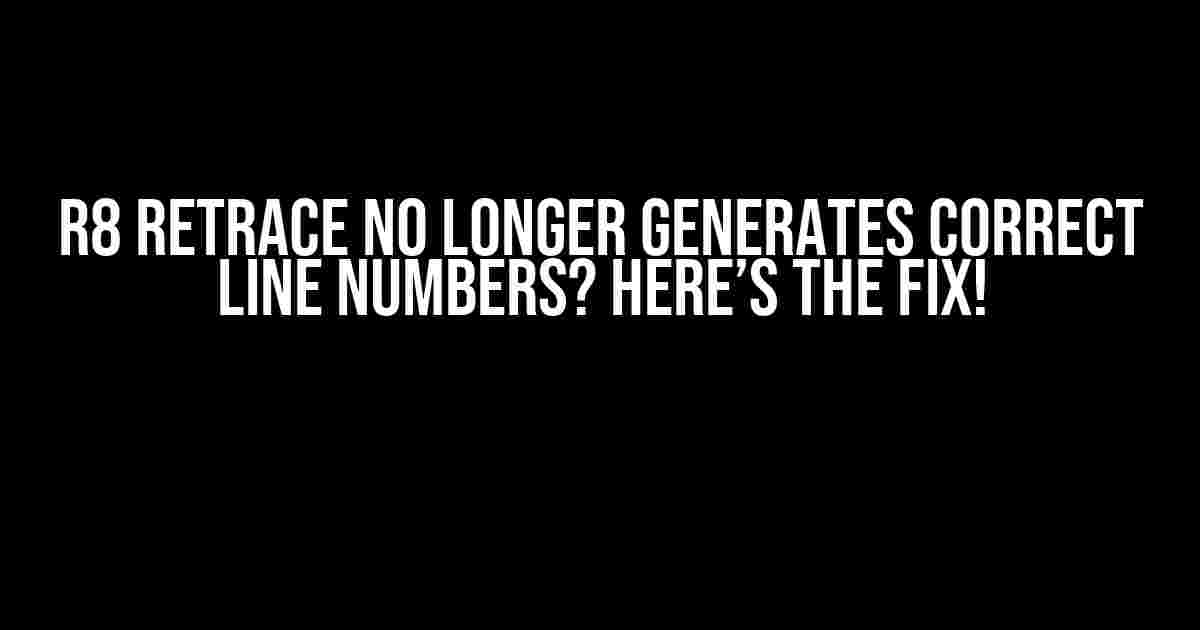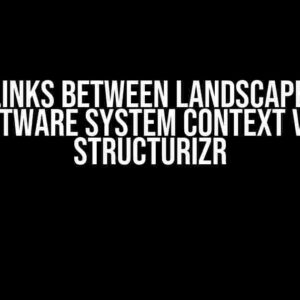Are you tired of staring at incorrect line numbers in your R8 retrace output? You’re not alone! The R8 retrace feature is an essential tool for developers, allowing us to debug our code efficiently. However, when it starts generating incorrect line numbers, it can be frustrating and hinder our productivity. In this article, we’ll dive into the reasons behind this issue and provide a step-by-step guide on how to fix it.
Why is R8 Retrace Not Generating Correct Line Numbers?
Before we dive into the solutions, let’s first understand the possible reasons behind this issue. There are a few common causes that might lead to incorrect line numbers in R8 retrace:
- Incompatible Java Version**: R8 requires a specific Java version to function correctly. If you’re using an incompatible version, it might lead to incorrect line numbers.
- Incorrect Configuration**: Misconfigured R8 settings or Android Gradle Plugin versions can cause issues with line number generation.
- Source Code Changes**: Changes in your source code, such as refactoring or updating dependencies, can affect the line numbers generated by R8.
Before we start fixing the issue, let’s go through some troubleshooting steps to identify the root cause:
- Verify Java Version**: Check your Java version by running
java -versionin your terminal. Ensure you’re using a compatible version (Java 8 or later). - Check R8 Configuration**: Review your R8 configuration files (e.g.,
r8-config.json) and Android Gradle Plugin versions to ensure they’re correct and up-to-date. - Review Source Code Changes**: Identify any recent changes in your source code that might be affecting line number generation. Try reverting changes or updating dependencies to see if it resolves the issue.
Now that we’ve identified the potential causes and troubleshooted the issue, let’s move on to the solutions:
Solution 1: Update R8 Configuration
The first solution is to update your R8 configuration files to ensure they’re correct and compatible:
{
"optimizationLevel": "2",
"minification": {
"renameVariables": false
},
"debugOptions": {
"enableLineNumbers": true
}
}
In this example, we’re setting the optimization level to 2 and disabling variable renaming. We’re also enabling line number generation by setting enableLineNumbers to true.
Solution 2: Update Android Gradle Plugin
If updating the R8 configuration doesn’t work, try updating the Android Gradle Plugin to the latest version:
dependencies {
classpath 'com.android.tools.build:gradle:4.1.0'
}
In this example, we’re updating the Android Gradle Plugin to version 4.1.0. Make sure to replace the version with the latest one available.
Solution 3: Use Java 8 or Later
If you’re still experiencing issues, ensure you’re using Java 8 or later:
java -version openjdk 14.0.2 2022-06-08 OpenJDK Runtime Environment (build 14.0.2+12-46) OpenJDK 64-Bit Server VM (build 14.0.2+12-46, mixed mode, sharing)
In this example, we’re using OpenJDK 14.0.2, which is compatible with R8.
Solution 4: Clean and Rebuild Project
Sometimes, a simple clean and rebuild of your project can resolve the issue:
./gradlew clean ./gradlew build
Run these commands in your terminal to clean and rebuild your project.
Best Practices to Avoid Incorrect Line Numbers
To avoid incorrect line numbers in the future, follow these best practices:
- Regularly Update R8 Configuration**: Ensure your R8 configuration files are up-to-date and compatible with the latest Android Gradle Plugin versions.
- Monitor Source Code Changes**: Keep track of changes in your source code and test your R8 retrace output regularly to catch any issues early.
- Use Compatible Java Versions**: Always use compatible Java versions (Java 8 or later) to ensure R8 functions correctly.
Incorrect line numbers in R8 retrace can be frustrating, but by following the troubleshooting steps and solutions outlined in this article, you should be able to resolve the issue. Remember to maintain best practices to avoid encountering this problem in the future. Happy debugging!
| Solution | Description |
|---|---|
| Update R8 Configuration | Ensure R8 configuration files are correct and compatible. |
| Update Android Gradle Plugin | Update the Android Gradle Plugin to the latest version. |
| Use Java 8 or Later | Ensure you’re using a compatible Java version (Java 8 or later). |
| Clean and Rebuild Project | Clean and rebuild your project to resolve any issues. |
Frequently Asked Question
Stuck with R8 retrace and its line numbers? We’ve got you covered!
What is R8 retrace, and how does it affect my code?
R8 retrace is a tool used to map obfuscated stack traces back to their original code. It’s a part of the Android build process, and it helps developers debug their code. However, sometimes R8 retrace might stop generating correct line numbers, making it difficult to identify the source of an error.
Why has R8 retrace stopped generating correct line numbers?
There could be several reasons why R8 retrace is no longer generating correct line numbers. One common reason is that the mapping file might be missing or corrupted. Another possibility is that the R8 version is outdated or incompatible with your build tool. Additionally, incorrect configuration or version conflicts in your build script might also cause issues with R8 retrace.
How can I troubleshoot the issue with R8 retrace?
To troubleshoot the issue, start by checking the R8 version and ensuring it’s compatible with your build tool. Verify that the mapping file is present and correct. You can also try cleaning and rebuilding your project or checking the build logs for any errors. If the issue persists, try updating your build tools or seeking help from the Android developer community.
Can I use an alternative to R8 retrace for debugging?
Yes, there are alternative tools available for debugging and deobfuscating your code. One popular alternative is the ProGuard retrace tool, which serves a similar purpose to R8 retrace. However, keep in mind that R8 retrace is specifically designed for Android development, and alternatives might not provide the same level of compatibility and integration.
How can I prevent R8 retrace issues in the future?
To prevent R8 retrace issues in the future, make sure to regularly update your build tools and plugins. Keep your project configuration and scripts organized, and double-check the mapping file and R8 version after each update. Additionally, testing your app thoroughly during development can help you catch any potential issues early on.


